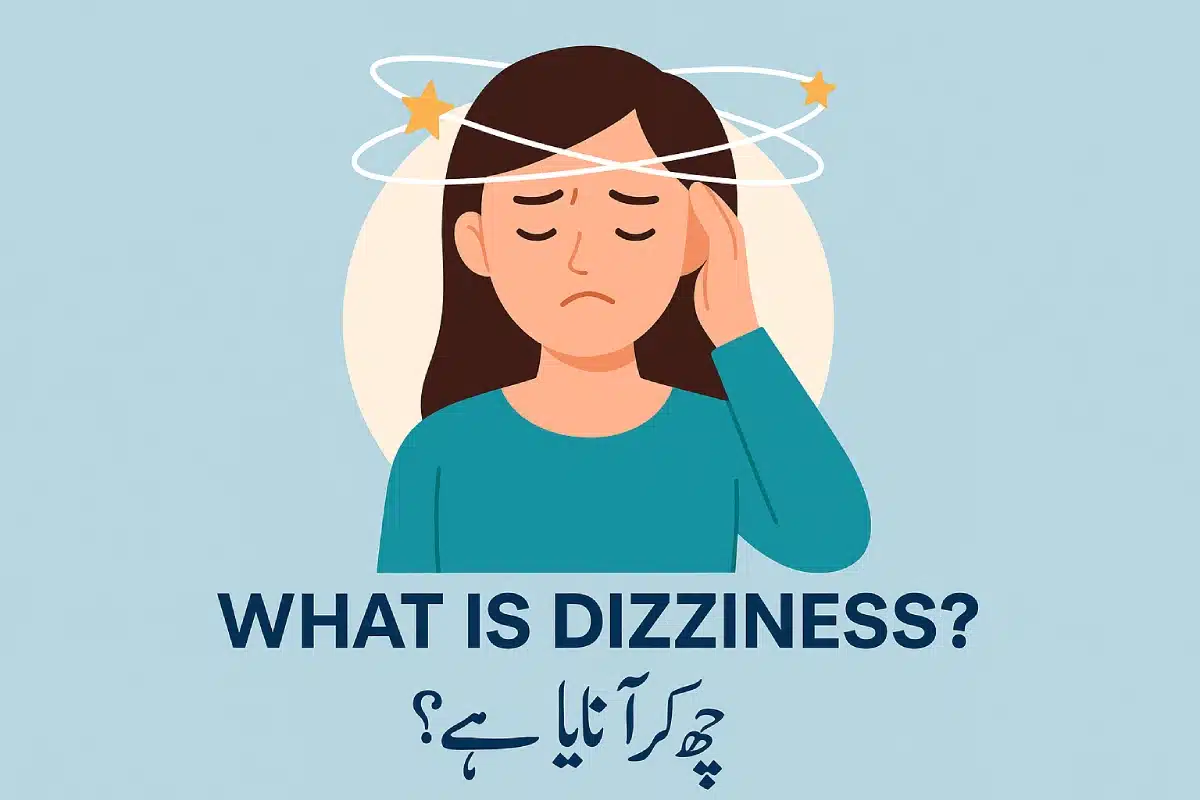(چکر آنا کیا ہے؟ اقسام، علامات، وجوہات اور علاج)
What is Dizziness? | Meaning In Urdu, 4 Types, Causes, Symptoms & Best Treatment
Dizziness (چکر آنا) is one of the most common health symptoms experienced by people of all ages. It refers to a feeling of light-headedness, imbalance, or spinning — as if the world around you is moving even when you’re standing still. While it may seem harmless, frequent dizziness can signal an underlying health issue that requires attention. The experience of dizziness can vary widely among individuals, with some describing it as a mild sensation while others may find it debilitating. This variation makes understanding the underlying factors critical to effective treatment.
What Dizziness? Meaning in Urdu (چکر آنا کیا ہے؟)
“Dizziness” in Urdu means چکر آنا. It is a condition in which a person feels off-balance, faint, or unsteady. Sometimes, it is accompanied by blurred vision, nausea, or weakness, depending on its cause. Understanding the cultural implications and the perception of dizziness in different communities can also aid in recognising its significance and the urgency in seeking treatment.
4 Common Types of Dizziness
Understanding the type of dizziness is important for accurate diagnosis and treatment. Here are the four main types:
1. Vertigo (ورٹیگو)
This is the sensation that you or your surroundings are spinning. It’s often caused by inner ear problems such as Benign Paroxysmal Positional Vertigo (BPPV) or Meniere’s disease. Symptoms of vertigo can be quite alarming and may include a significant loss of balance, leading to falls. It is crucial to identify the underlying cause of vertigo for proper management.
2. Disequilibrium (توازن کا فقدان)
A feeling of imbalance or unsteadiness, especially while walking. It is usually linked to neurological issues or ear infections. Patients may find it challenging to navigate through crowded spaces due to the overwhelming feeling of losing balance, which can also impact their mental health.
3. Presyncope (بے ہوشی کا احساس)
A sensation that you’re about to faint or lose consciousness. This often occurs due to low blood pressure or heart-related problems. Understanding the triggers that lead to presyncope is essential, as it can sometimes be a precursor to more severe cardiovascular issues.
4. Lightheadedness (ہلکا پن یا سر چکرانا)
A mild spinning or floating feeling, often associated with dehydration, anxiety, or sudden changes in position. Lightheadedness can be particularly troubling for individuals with anxiety, leading to a cycle of fear and further dizziness.
Common Causes of Dizziness
Several factors can trigger dizziness, including temporary or chronic health conditions. Here are the most common causes:
- Low blood pressure or anemia
- Dehydration or heat exhaustion
- Inner ear infections (Labyrinthitis or Vestibular Neuritis)
- Low blood sugar (Hypoglycemia)
- Migraine or tension headaches
- Heart rhythm problems
- Vitamin B12 deficiency
- Side effects of certain medications
- Anxiety or panic attacks
Also, less common causes may include neurological disorders like Multiple Sclerosis or conditions affecting the cardiovascular system. A comprehensive assessment is vital in determining the exact cause of recurring dizziness.
Symptoms of Dizziness
Dizziness is usually accompanied by one or more of the following symptoms:
- Spinning or whirling sensation (Vertigo)
- Nausea or vomiting
- Blurred or double vision
- Weakness or fatigue
- Loss of balance
- Fainting spells
- Headache or pressure in the head
Recognising these symptoms can help individuals seek appropriate medical advice sooner rather than later, which can be critical in preventing complications.
Best Treatments for Dizziness
Treatment depends on the underlying cause. Here are some effective remedies and medical treatments:
1. Hydration
Drink plenty of water and electrolyte drinks to prevent dehydration — one of the most common causes of dizziness. Staying hydrated is particularly important during hot weather or after strenuous exercise.
2. Proper Diet
Include foods rich in iron, vitamin B12, and magnesium. Avoid caffeine and alcohol which can worsen dizziness. Maintaining a balanced diet can prevent deficiencies that lead to dizziness, especially for those with specific dietary restrictions.
3. Medication
Doctors may prescribe:
- Antihistamines (like Meclizine) for vertigo
- Antiemetics for nausea
- Vitamin supplements for nutritional deficiencies
Additionally, certain medications can help manage anxiety, which may also contribute to feelings of dizziness.
4. Vestibular Rehabilitation Therapy (VRT)
A special type of physical therapy that helps improve balance and reduce dizziness caused by inner ear issues. This therapy can be particularly beneficial for older adults or those with chronic conditions.
5. Lifestyle Adjustments
- Stand up slowly to prevent sudden drops in blood pressure
- Manage stress and anxiety through deep breathing or yoga
- Get enough sleep and avoid skipping meals
Incorporating these lifestyle changes can not only help manage dizziness but can improve overall health and well-being.
If dizziness persists for more than a few days, it’s important to consult a healthcare professional or visit MoonMedics.pk for genuine medicines and expert advice.
When to See a Doctor
Seek immediate medical help if dizziness is accompanied by:
- Sudden severe headache
- Fainting or chest pain
- Difficulty speaking or walking
- Blurred vision or weakness on one side
These could be signs of a stroke or heart problem requiring urgent care. Understanding the importance of these symptoms can be life-saving, as timely intervention is crucial.
Final Thoughts
Dizziness (چکر آنا) is a common but sometimes serious symptom. It can arise from simple causes like dehydration or signal a deeper health issue. At MoonMedics.pk, we provide genuine medicines, health supplements, and medical consultation services to help you recover safely and effectively. Remember, understanding dizziness is the first step towards effective management and recovery. Ultimately, if you are wondering What is Dizziness?, it is essential to approach this symptom with both caution and knowledge.


Pingback: Sildenafil in Pakistan – Complete Guide to Uses, Benefits, Side Effects & Price